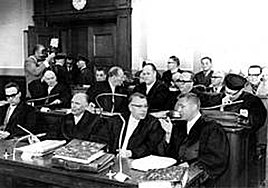| Sobibór trial | |
|---|---|
 Opening of the Sobibor trial at the District Court in Hagen on 9 June 1965 | |
| Court | Urteil LG Hagen, West Germany |
| Started | 6 September 1965 |
| Decided | 20 December 1966 |
The Sobibor trial was a 1965–66 judicial trial in the West German prosecution of SS officers who had worked at Sobibor extermination camp; it was held in Hagen.[1][2] It was one of a series of similar war crime trials held during the early and mid-1960s, such as the 1961 trial of Adolf Eichmann by Israel in Jerusalem, and the Frankfurt Auschwitz trials of 1963–65, also held in West Germany. These trials heightened general public and international understanding of the extent of the crimes that had been perpetrated in occupied Poland some twenty years earlier by Nazi bureaucrats and persons acting as their executioners.
The Soviet Union conducted trials in the 1960s of former Trawniki men, mostly Ukrainian Soviet POWs who had trained for the Nazis and worked at Sobibor. Most were convicted and executed. In these and subsequent years, separate trials prosecuted personnel of the Belzec (1963–65), Treblinka (1964–65), and Majdanek (1975–81) extermination camps, all of which had been located in Poland.